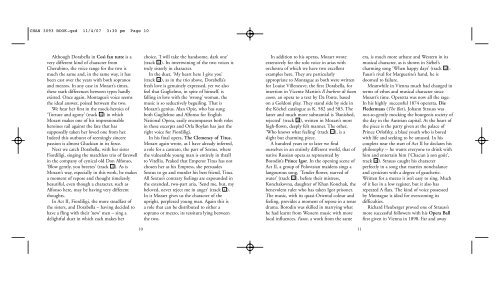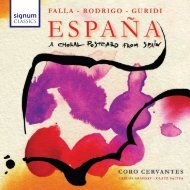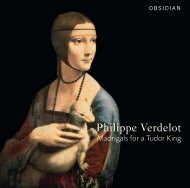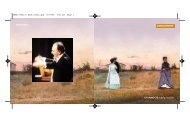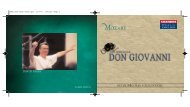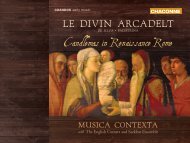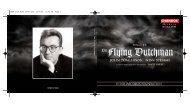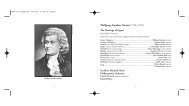CHAN 3093 BOOK.qxd - Chandos
CHAN 3093 BOOK.qxd - Chandos
CHAN 3093 BOOK.qxd - Chandos
You also want an ePaper? Increase the reach of your titles
YUMPU automatically turns print PDFs into web optimized ePapers that Google loves.
<strong>CHAN</strong> <strong>3093</strong> <strong>BOOK</strong>.<strong>qxd</strong> 11/4/07 3:30 pm Page 10<br />
Although Dorabella in Così fan tutte is a<br />
very different kind of character from<br />
Cherubino, the voice range for the two is<br />
much the same and, in the same way, it has<br />
been cast over the years with both sopranos<br />
and mezzos. In any case in Mozart’s times,<br />
these stark differences between types hardly<br />
existed. Once again, Montague’s voice seems<br />
the ideal answer, poised between the two.<br />
We hear her first in the mock-heroics of<br />
‘Torture and agony’ (track<br />
8<br />
) in which<br />
Mozart makes one of his impressionable<br />
heroines rail against the fate that has<br />
supposedly taken her loved one from her.<br />
Indeed this outburst of seemingly sincere<br />
passion is almost Gluckian in its force.<br />
Next we catch Dorabella, with her sister<br />
Fiordiligi, singing the matchless trio of farewell<br />
in the company of cynical old Don Alfonso,<br />
‘Blow gently, you breezes’ (track<br />
7<br />
). As is<br />
Mozart’s way, especially in this work, he makes<br />
a moment of repose and thought timelessly<br />
beautiful, even though a character, such as<br />
Alfonso here, may be having very different<br />
thoughts.<br />
In Act II, Fiordiligi, the more steadfast of<br />
the sisters, and Dorabella – having decided to<br />
have a fling with their ‘new’ men – sing a<br />
delightful duet in which each makes her<br />
choice, ‘I will take the handsome, dark one’<br />
(track<br />
9<br />
). Its intertwining of the two voices is<br />
truly sisterly in character.<br />
In the duet, ‘My heart here I give you’<br />
(track<br />
12<br />
), as in the trio above, Dorabella’s<br />
fresh love is genuinely expressed, yet we also<br />
feel that Guglielmo, in spite of himself, is<br />
falling in love with the ‘wrong’ woman, the<br />
music is so seductively beguiling. That is<br />
Mozart’s genius. Alan Opie, who has sung<br />
both Guglielmo and Alfonso for English<br />
National Opera, easily encompasses both roles<br />
in these excerpts and Orla Boylan has just the<br />
right voice for Fiordiligi.<br />
In his final opera, The Clemency of Titus,<br />
Mozart again wrote, as I have already inferred,<br />
a role for a castrato, the part of Sextus, where<br />
the vulnerable young man is entirely in thrall<br />
to Vitellia. Peaked that Emperor Titus has not<br />
chosen her as his Empress, she persuades<br />
Sextus to go and murder his best friend, Titus.<br />
All Sextus’s contrary feelings are expounded in<br />
the extended, two-part aria, ‘Send me, but, my<br />
beloved, never reject me in anger’ (track<br />
2<br />
).<br />
In it Mozart gives us the character of the<br />
upright, perplexed young man. Again this is<br />
a role that can be distributed to either a<br />
soprano or mezzo, its tessitura lying between<br />
the two.<br />
In addition to his operas, Mozart wrote<br />
extensively for the solo voice in arias with<br />
orchestra of which we have two excellent<br />
examples here. They are particularly<br />
appropriate to Montague as both were written<br />
for Louise Villeneuve, the first Dorabella, for<br />
insertion in Vicente Martin’s Il burbero di buon<br />
cuore, an opera to a text by Da Ponte, based<br />
on a Goldoni play. They stand side by side in<br />
the Köchel catalogue as K. 582 and 583. The<br />
latter and much more substantial is ‘Banished,<br />
rejected’ (track<br />
10<br />
), written in Mozart’s most<br />
high-flown, deeply felt manner. The other,<br />
‘Who knows what feeling’ (track<br />
11<br />
), is a<br />
slight but charming piece.<br />
A hundred years or so later we find<br />
ourselves in an entirely different world, that of<br />
native Russian opera as represented by<br />
Borodin’s Prince Igor. In the opening scene of<br />
Act II, a group of Polovtsian maidens sings a<br />
langourous song, ‘Tender flower, starved of<br />
water’ (track<br />
14<br />
), before their mistress,<br />
Konchakovna, daughter of Khan Konchak, the<br />
benevolent ruler who has taken Igor prisoner.<br />
The music, with its quasi-Oriental colour and<br />
feeling, provides a moment of repose in a tense<br />
drama. Borodin was skilled in marrying what<br />
he had learnt from Western music with more<br />
local influences. Faust, a work from the same<br />
era, is much more urbane and Western in its<br />
musical character, as is shown in Siébel’s<br />
charming song ‘When happy days’ (track<br />
16<br />
).<br />
Faust’s rival for Marguerite’s hand, he is<br />
doomed to failure.<br />
Meanwhile in Vienna much had changed in<br />
terms of ethos and musical character since<br />
Mozart’s time. Operetta was now all the rage.<br />
In his highly successful 1874 operetta, Die<br />
Fledermaus (The Bat), Johann Strauss was<br />
not-so-gently mocking the bourgeois society of<br />
the day in the Austrian capital. At the heart of<br />
the piece is the party given at the palace of<br />
Prince Orlofsky, a blasé youth who is bored<br />
with life and seeking to be amused. In his<br />
couplets near the start of Act II he declares his<br />
philosophy -- he wants everyone to drink with<br />
him and entertain him (‘Chacun à son goût’,<br />
track<br />
15<br />
). Strauss caught his character<br />
perfectly in a song that marries nonchalance<br />
and cynicism with a degree of gaucherie.<br />
Written for a mezzo it isn’t easy to sing. Much<br />
of it lies in a low register, but it also has<br />
repeated A flats. The kind of voice possessed<br />
by Montague is ideal for overcoming its<br />
difficulties.<br />
Richard Heuberger proved one of Strauss’s<br />
more successful followers with his Opera Ball<br />
first given in Vienna in 1898. Far and away<br />
10 11


